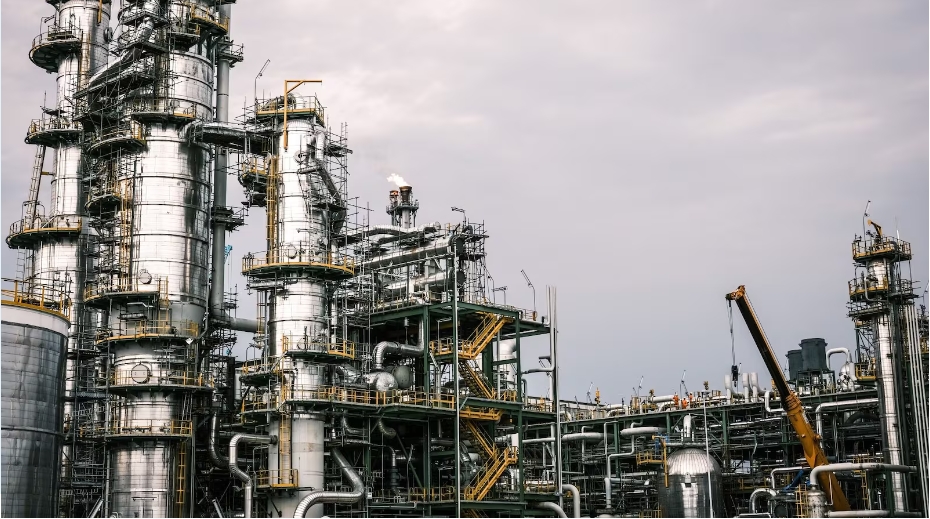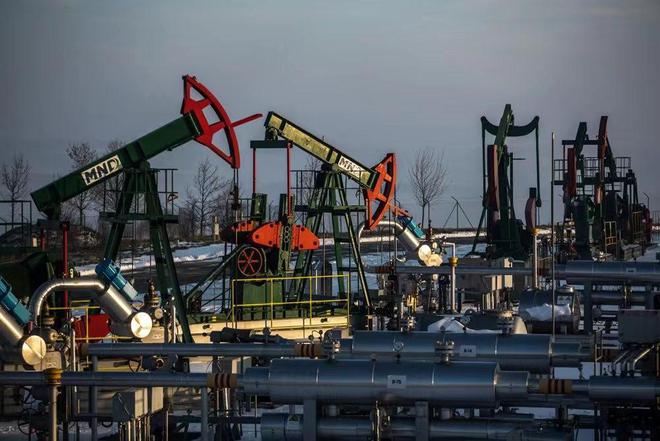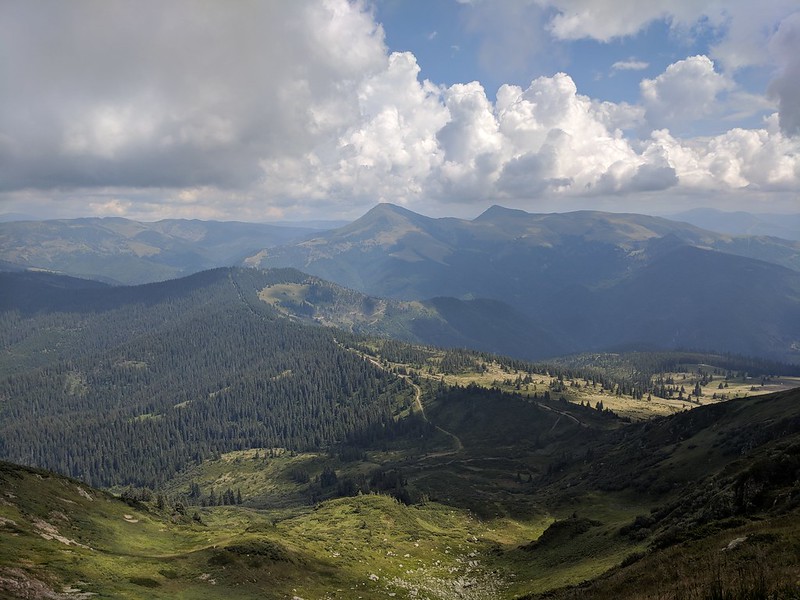
A report prepared by Yuliia Demchuk and Taras Popadynets from the NGO “Geothermal Ukraine” goes into detail on the geothermal potential of Ukraine and the best areas for development.
The history of geothermal exploration in Ukraine
Studies on the geothermal potential of Ukraine have been done since the 1950’s, resulting in a large selection of thermophysical and chemical data, identified geological structures, isotherm maps, resource capacity maps, and estimated figures of geothermal reserves. The first estimation of geothermal resources in Ukraine was carried out in 1979, with an approximate potential of 27.3 million cubic meters of geothermal fluids per day, or equivalent to a thermal power capacity of 351 million GJ per year.
The total potential of small hydro- and thermal energy is estimated at 438*106 kWh / year, which was approved in the Program of state support for the development of non-traditional and renewable energy sources and is equivalent to fuel reserves in the amount of 50·106 t of conventional fuel.
The geothermal resources of Ukraine are primarily thermal waters and hot dry rocks. The could be classified as the following types of sources:
Shallow geothermal – the heat of the upper layers of the the Earth down to 500 meters depth, which can be used for heat pump installations;
Thermal waters – the heat of deep, underground thermal waters, which can be used for heating and power generation;
Deep geothermal – the heat from superheated dry rocks, which can be harnessed with the help of borehole heat exchanges or by creating artificial underground permeable collectors
In additional, geothermal resources may be tapped by the operating wells in oil and gas fields.
Geological indicators of geothermal potential
The distribution of geothermal resources in Ukraine is primarily determined by heat flow, geological formations, and the activity of tectonic and magmatic processes. The figure below shows the distribution of deep heat flow in Ukraine.
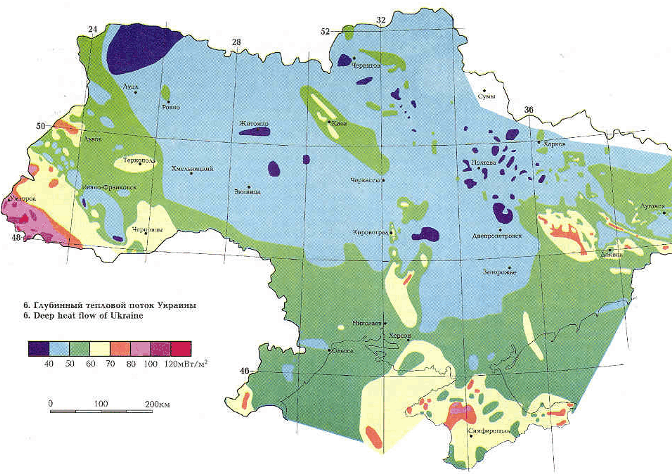
Distribution of deep heat flux in the territory of Ukraine, mW/m2 (source: Askja Energy)
Carpathian fold and thrust belt region in the west, consisting of the Transcarpathian Mountains, Carpathian Mountains, and Transcarpathian Depression
Dnipro-Donets Depression and Donetsk folded region in the east
Black Sea Basin and Scythian Plate in the south
These three regions also happen to have oil and gas basins:
The Western Ukrainian region (consisting of Volyn-Podilska, Precarpathian, Carpathian, Transcarpathian oil and gas provinces);
The Dnipro-Donekts oil and gas basin in the east; and
The South Crimea oil and gas basin in the south.
The figure below shows the prospective regions for the use of geothermal resources in Ukraine, classified as Highly promising, Really promising, Potentially promising, Not very promising, and Unpromising.
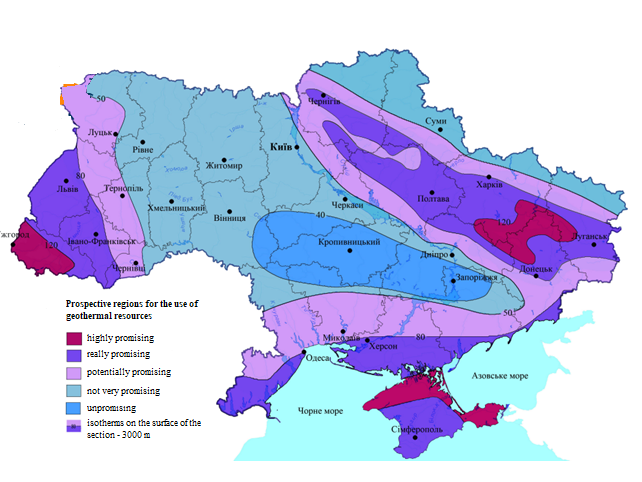
Prospective regions for the use of geothermal resources in Ukraine (source: “Atlas of energy potential of renewable energy in Ukraine
According to geological and structural features, the most promising sites for geothermal developing in Ukraine are the Transcarpathian and Precarpathian depression in the west, and the Steppe Crimea and Black Sea Coast in the south, and the Dnipro-Donets Depression in the east. For the first two regions, geological and geophysical data indicate that rock temperatures at depths of up to 6 kilometers may be in the range of 230 to 275 degrees Celsius.
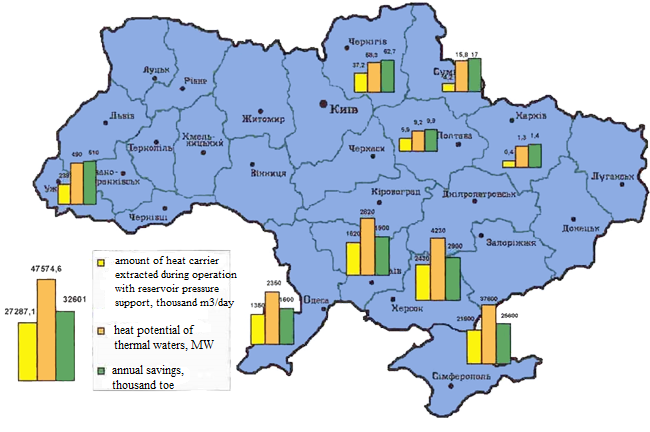
Applications of geothermal in Ukraine
The use of geothermal energy for heating, water supply and air-conditioning in residential and public buildings and structures in cities and rural areas, as well as the technological use of the Earth’s deep heat in various industries, is a rather promising direction of energy-saving technological policy. These will allow for significant savings in traditional fuel and agriculture. Geothermal waters are the most widespread and currently suitable for technical use sources of geothermal energy in Ukraine. One of the promising directions of the development of geothermal energy is the creation of combined energy technology nodes for obtaining electricity, heat, and valuable components contained in geothermal sources.
The latest technologies make it possible to reduce the negative impact that occurs during the operation of geothermal energy sources to a minimum. Assessments made by a number of organizations have shown that the development of geothermal heat supply systems can allow not only to save fuel, but also to simplify the solution of environmental problems and create favorable sanitary and housing conditions for the life and work of the population.
Thus, geothermal resources are important and promising in Ukraine’s national energy production, and there is potential for geothermal energy to become one of the leading sources of the country’s heat and power generation in the near future.


